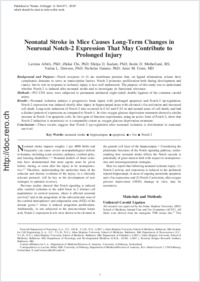Neonatal stroke in mice causes long-term changes in neuronal notch-2 expression that may contribute to prolonged injury
- Alberi, Lavinia Department of Neurology, Johns Hopkins University School of Medicine, Baltimore, USA - Institute for Cell Engineering, Johns Hopkins University School of Medicine, Baltimore, USA
- Chi, Zhikai Department of Neurology, Johns Hopkins University School of Medicine, Baltimore, USA - Institute for Cell Engineering, Johns Hopkins University School of Medicine, Baltimore, USA - Department of Neuroscience, Johns Hopkins University School of Medicine, Baltimore, USA
- Kadam, Shilpa D. Department of Neurology, Johns Hopkins University School of Medicine, Baltimore, USA - Department of Neurology and Developmental Medicine, Kennedy Krieger Research Institute, Baltimore, USA
- Mulholland, Justin D. Department of Neurology and Developmental Medicine, Kennedy Krieger Research Institute, Baltimore, USA
- Dawson, Valina L. Department of Neurology, Johns Hopkins University School of Medicine, Baltimore, USA - Institute for Cell Engineering, Johns Hopkins University School of Medicine, Baltimore, USA - Department of Neuroscience, Johns Hopkins University School of Medicine, Baltimore, USA
- Gaiano, Nicholas Institute for Cell Engineering, Johns Hopkins University School of Medicine, Baltimore, USA - Department of Neuroscience, Johns Hopkins University School of Medicine, Baltimore, USA
- Comi, Anne M. Department of Neurology, Johns Hopkins University School of Medicine, Baltimore, USA - Department of Pediatrics, Johns Hopkins University School of Medicine, Baltimore, USA - Department of Neurology and Developmental Medicine, Kennedy Krieger Research Institute, Baltimore, USA
-
2010
Published in:
- Stroke. - 2010, vol. 41, no. Suppl. 1, p. S64-S71
English
Background and Purpose: Notch receptors (1–4) are membrane proteins that, on ligand stilumation, release their cytoplasmic domains to serve as transcription factors. Notch-2 promotes proliferation both during development and cancer, but its role in response to ischemic injury is less well understood. The purpose of this study was to understand whether Notch-2 is induced after neonatal stroke and to investigate its functional relevance.Methods: P12 CD1 mice were subjected to permanent unilateral (right-sided) double ligation of the common carotid artery.Results: Neonatal ischemia induces a progressive brain injury with prolonged apoptosis and Notch-2 up-regulation. Notch-2 expression was induced shortly after injury in hippocampal areas with elevated c-fos activation and increased cell death. Long-term induction of Notch-2 also occurred in CA1 and CA3 in and around areas of cell death, and had a distinct pattern of expression as compared to Notch-1. In vitro oxygen glucose deprivation treatment showed a similar increase in Notch-2 in apoptotic cells. In vitro gain of function experiments, using an active form of Notch-2, show that Notch-2 induction is neurotoxic to a comparable extent as oxygen glucose deprivation treatment.Conclusions: These results suggest that Notch-2 up-regulation after neonatal ischemia is detrimental to neuronal survival.
- Faculty
- Faculté des sciences et de médecine
- Department
- Médecine 3ème année
- Language
-
- English
- Classification
- Biological sciences
- License
-
License undefined
- Identifiers
-
- RERO DOC 20814
- DOI 10.1161/STROKEAHA.110.595298
- Persistent URL
- https://folia.unifr.ch/unifr/documents/301816
Statistics
Document views: 195
File downloads:
- pdf: 189
